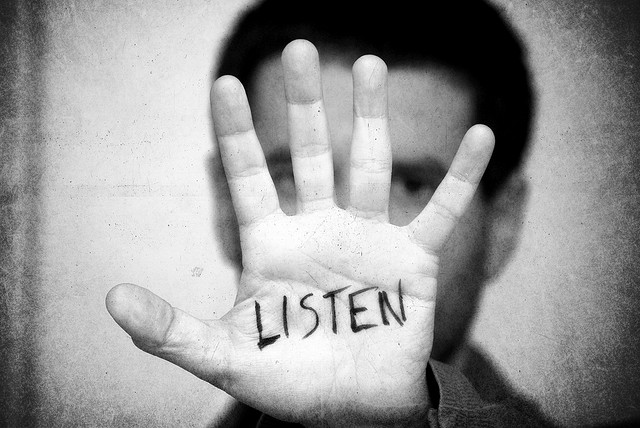
The phrase “Customer Listening” or its partner-in-crime “Voice of the Customer” always elicits my twitch. Perhaps that’s because it sounds so dang phony, so “I serve people–perhaps I should learn their modern communication ways.” As if that should be followed by, “Surprise!” and accompanied by a photo of a fellow donning a Captain Underpants outfit over his worsted-wool suit. “I have supreme confidence I know it all!” might be what he said the day before.
I’m not against organizations engaging directly with people buying their wares. Nor am I insulted when companies distill from social media fresh insights on how people feel. If you’re doing one or both of those things, keep on doing that. Please. Consider doing more. Consider some of the amazing analytics tools from IBM and the like that let you find sea glass below your big data ocean. And we all know, with social media there’s plenty afloat. Hearing a brilliant whisper amid shouts has never been easier. Hurray! If you had supreme confidence yesterday, next week you’ll surely have more.
Yet despite customer listening campaigns and analytics capabilities, it’s seems to me that hearing still languishes. Listening is an activity. Hearing creates a change.
Never was this discrepancy more personal to me than when I learned of a new Kickstarter project. Imagining Learning interviews students across the U.S. on their experiences in school and how they might improve the place where they’ve been assigned to go learn. As you’ve possibly done a dozen or more times before, I went to the Kickstarter project page and I began watching (and listening) to some of the students who had been interviewed. Go do that. I’ll wait. Now welcome back.
Then I realized I hadn’t heard a word they had said. Did you? At first I noticed myself evaluating the quality of the campaign page. Why hadn’t they raised more yet? My social-media marketing instincts went into high gear. I asked myself, “Why wasn’t there a link to the actual interviews I’d heard described?” I want to help, but but but…
Only after a student in the video asked, “Can you come back next week?” did I catch a slapagram that broke my good-listener trance. Holy crap, I realized quickly. These aren’t people who it would be nice to listen to as part of some due diligence. These are people who go to school every day where they’re not listened to deeply. They’re in a place–in this case a school–where their voices are part of exercises and greater plans, not heard as opinions and perspectives that could possibly change everything. They aren’t some “other” group of people any more than customers are a company’s “others.” Students are why there are schools–not as recipients of goo to be poured into their heads. Not any differently than customers–the you-s and me-s of the world (who are students, too, by the way)–who are why companies exist at all.
When we focus on the listening, not the hearing, we can easily get caught up in the exercise and the greater plans. We can too easily forget that even if we knew everything, people want to be heard. And in our hearing them, in our resonating and acknowledging… in our internalizing and mixing their thoughts with ours… we can co-create something better than either of us could have done without the “other.”
In a business, learning of a technical issue with your website or your product ought to elicit questions to discover how to solve the problem (and prevent anyone else from having it). It ought to be one part of a healthy relationship between people who fundamentally need one another.
In a school, hearing a student–even if it requires bringing in an outside team to do the interviewing–ought to elicit questions to discover (and act on) how young minds imagine their world could be made better. Right here, right now.
If you haven’t already, check out the Imagining Learning project. They are working on creating a national collective voice. They (and I) believe students have invaluable things to say. How can we improve education? Really listen to young people.
Perhaps this project will remind you of something we can all hear again.
In a world with so much noise, sometimes the most insightful voices need to be both listened to and heard.
photo credit: Bryan Rosengrant, y2.d7 I that edit girl
